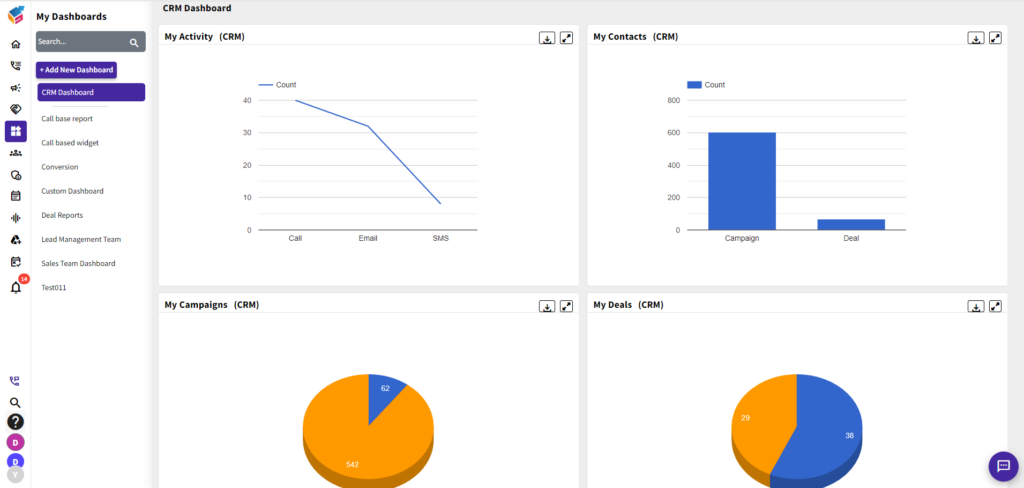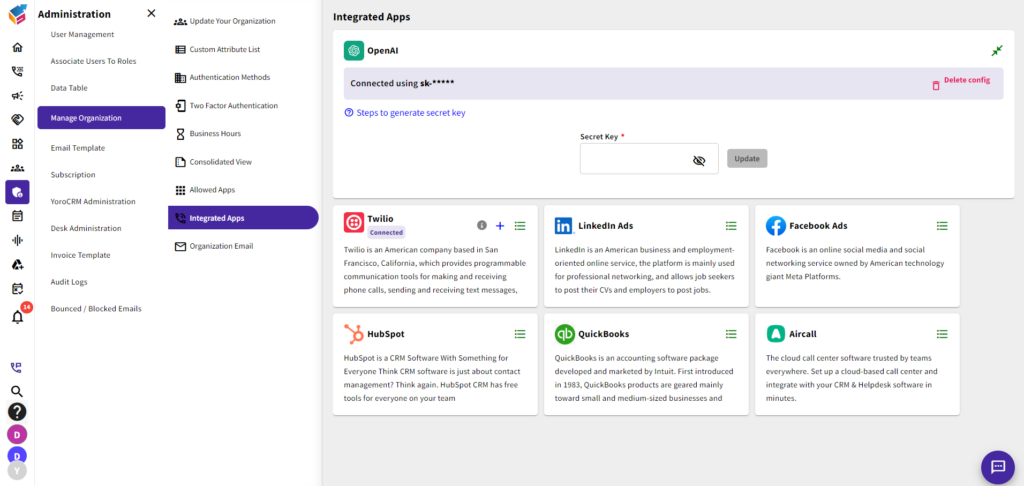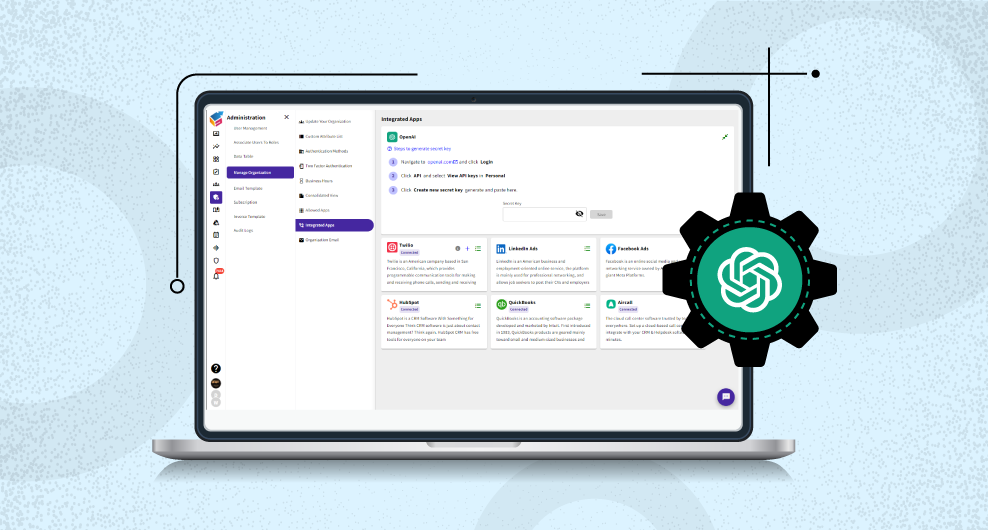Table of Contents
In today’s fast-paced and highly competitive business environment, customer relationship management (CRM), workflow automation software, CRM integration, AI in business, and natural language processing (NLP) have become vital components of any successful business operations. With the advent of artificial intelligence (AI) and natural language processing (NLP), businesses now have access to powerful tools that can help them better engage with customers and streamline their operations.
One such tool is ChatGPT-3, an AI language model that can generate human-like responses to natural language queries. By integrating ChatGPT-3 with your CRM automation system, you can supercharge your customer interactions and gain a competitive advantage.
What is ChatGPT-3?
ChatGPT-3 is a state-of-the-art language model developed by OpenAI that can generate human-like responses to natural language queries. It is trained on a massive dataset of text from the internet, books, and other sources, which enables it to understand and respond to a wide variety of queries. ChatGPT integration can be used for a wide range of applications, from chatbots to language translation to content generation.
What is CRM?
CRM stands for customer relationship management and refers to the process of managing interactions with customers and potential customers. A CRM system typically includes tools for managing customer data, tracking customer interactions, and analyzing customer behavior.

CRM software is essential for businesses of all sizes because they enable businesses to better understand their customers and improve customer satisfaction.
Can ChatGPT be used for CRM?
ChatGPT can be utilized for Customer Relationship Management (CRM) purposes. By integrating ChatGPT into CRM systems, businesses can enhance their customer interactions, automate responses to queries, and improve overall customer engagement. ChatGPT’s natural language processing capabilities allow it to understand and generate human-like responses, making it a valuable tool for handling customer inquiries, providing support, and facilitating communication within CRM platforms. This integration can contribute to more efficient and personalized interactions with customers, ultimately enhancing the overall CRM experience for both businesses and their clients.
Benefits of integrating ChatGPT-3 with CRM

Integrating ChatGPT-3 with your CRM system can provide several benefits for your business, including:
- Enhanced customer engagement: With ChatGPT-3, you can create chatbots that can respond to customer queries in real-time. Chatbots can help customers find the information they need quickly and easily, without the need for human intervention. This can lead to enhanced customer satisfaction and increased customer loyalty.
- Improved customer support: ChatGPT-3 can be used to create intelligent virtual assistants that can help customers with common queries and issues. This can free up your customer support team to focus on more complex issues, improving response times and reducing the workload on your support team.
- Increased efficiency: ChatGPT-3 can automate many routine tasks, such as responding to common queries and scheduling appointments. This can free up your employees to focus on more complex tasks and improve overall efficiency.
- Personalized marketing: With ChatGPT-3, you can create personalized marketing messages that are tailored to individual customers based on their previous interactions with your business. This can lead to increased sales and improved customer satisfaction.
- Better data analysis: ChatGPT-3 can analyze customer data and provide insights into customer behavior and preferences. This can help you identify areas for improvement and develop more effective marketing and sales strategies.
Limitations of ChatGPT-3
While ChatGPT-3 is a powerful language model with many potential applications, there are also limitations that should be considered. Here are some of the key limitations of ChatGPT-3:
- Bias: Like any machine learning model, ChatGPT-3 can be biased towards certain types of data or language. This can result in inaccurate or inappropriate responses to certain queries or interactions.
- Contextual understanding: ChatGPT-3 does not have a deep understanding of context, which can limit its ability to provide accurate or relevant responses in certain situations. For example, it may struggle to understand sarcasm or irony in language.
- Limited training data: While ChatGPT-3 has been trained on a massive dataset of text, there are still limitations to the amount and quality of data that can be used to train the model. This can impact its ability to provide accurate or relevant responses in certain situations.
- Dependence on training data: ChatGPT-3 relies heavily on the training data it has been exposed to, which can limit its ability to generalize to new or unfamiliar situations.
- Cost: ChatGPT-3 is a proprietary language model developed by OpenAI, and access to the model can be expensive for businesses that want to integrate it into their operations.
- Limited control: While ChatGPT-3 can generate human-like responses, it can also produce responses that are unpredictable or inappropriate. This can limit the level of control that businesses have over the interactions that take place using the model.
While ChatGPT-3 is a powerful language model with many potential applications, it is important to be aware of its limitations when considering its use in your business. By understanding these limitations and developing strategies to mitigate them, businesses can make the most of ChatGPT-3 and other AI tools to improve their operations and better serve their customers.
On CRM: 5 Ways to Use ChatGPT in Your Business Right Now
ChatGPT is a powerful AI language model that can be integrated into your CRM platform to improve customer engagement, streamline customer service, and provide personalized support to your customers. Here are five ways that you can use ChatGPT in your business right now:
- Automate customer service: ChatGPT can be integrated into your CRM automation software to provide automated customer service through chatbots and virtual assistants. This can help to reduce the workload on your customer service team, provide 24/7 support to your customers, and improve response times.
- Personalize marketing campaigns: ChatGPT can analyze customer data and provide insights into customer behavior and preferences. This can be used to personalize marketing campaigns and provide targeted recommendations and promotions to individual customers.
- Streamline sales processes: ChatGPT can assist with lead qualification and provide sales teams with real-time information about customer behavior and preferences. This can help to streamline the sales process automation and improve conversion rates.
- Improve customer engagement: ChatGPT can be used to provide personalized support to customers through chatbots and virtual assistants. This can help to improve customer engagement and satisfaction by providing instant responses to customer queries.
- Analyze customer feedback: ChatGPT can be used to analyze customer feedback and provide insights into customer satisfaction and preferences. This can help businesses to identify areas for improvement and develop strategies to better meet the needs of their customers.
Conclusion
Integrating ChatGPT-3 with your CRM system can provide several benefits for your business, including enhanced customer engagement, improved customer support, increased efficiency, personalized marketing, and better data analysis. By leveraging the power of AI and NLP, businesses can gain a competitive advantage and better serve their customers. If you’re interested in learning more about how ChatGPT-3 can benefit your business, contact us today to schedule a demo.




